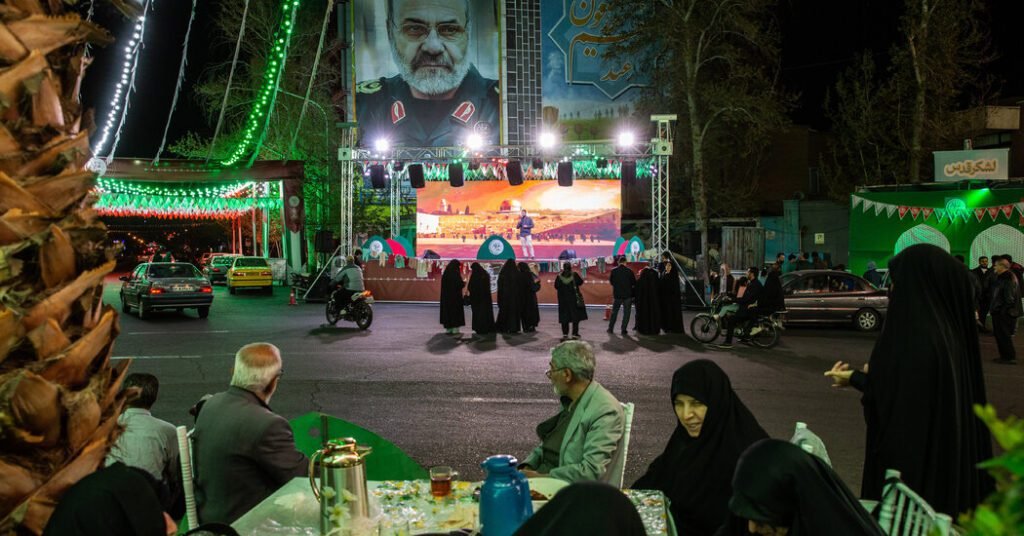Iranian security forces faced simultaneous terror attacks by a militant separatist group in a southwestern province that raged for nearly 17 hours, with heavy fighting on the streets of two cities resulting in the deaths of 10 security officers and 18 militants, the Interior Ministry said on Thursday.
State television broadcast footage of gunmen running through the streets of Sistan Baluchistan province as heavy rockets and gunfire rocked the two cities and plumes of smoke rose into the air. Forty-four people were injured, the ministry said.
Jaish al-Adl, a separatist Baloch ethnic group designated a terrorist organization by the United States, claimed responsibility for the attacks.
Iran’s deputy interior minister, Majid Mirahmadi, told state television that fighting raged for hours, from 10pm on Wednesday to 3pm the following day. The gunmen entered homes, taking civilians hostage to use as human shields, but security forces freed them, he said. The fighters were wearing explosive vests and several blew themselves up during the fighting, he added.
The gunmen tried to seize military bases belonging to the Islamic Revolutionary Guard Corps, which is responsible for Iran’s border security, in the cities of Chabahar, home to a shipping port, and Rask, according to a Guards statement published on Iranian news. media.
“They did not achieve their ominous goals and they failed,” Mr Mirahmadi told state television. “Their objective was to capture the Revolutionary Guards headquarters in Rask and witness the security forces and capture the Guards headquarters, naval outposts and security forces headquarters in Chabahar.”
The attacks came at a time of heightened tension in the country. Israeli airstrikes on the Iranian embassy in the Syrian capital, Damascus, killed three senior commanders of the Guards’ Quds Force and four officers on Monday. Iranian officials vowed to retaliate against Israel.
The southwestern region of Iran where the attacks took place is a restive and underdeveloped region near the borders of Pakistan and Afghanistan. A powerful network of traffickers, drug lords and separatist Sunni militant groups such as Jaish al-Adl operate in the region. Clashes with security forces along the border are frequent. Sistan Baluchestan’s population, which is predominantly ethnic Baluch and Sunni, has long accused the central Shiite government of systematic discrimination.
Jaish al-Adl, known informally as Jundullah, said in a statement that 168 of its fighters had taken part in the attack. The statement said the aim was to stop Iran’s development of an area known as Makan, on the coast of the Persian Gulf, which the group said threatened its Sunni-dominated demographic.
The Revolutionary Guards’ statement warned that the security of the Iranian people was a red line and that Iran’s enemies — “regional and terrorist groups commissioned by its intelligence services” — would be dealt with forcefully. State television, blaming Israel, also said “Zionist masters” had ordered the terror attacks.
A local Baloch rights activist who asked to be identified only by her middle name, Zimba, fearing reprisals, said the attacks had shocked people and caught them off guard as they closely followed the drama unfolding on television. . and social media. He lives in Zahedan, a town in Sistan Baluchestan, which he said has remained calm.
Videos on state television and social media showed the walls and ceilings of a Revolutionary Guard security building in Chabahar riddled with bullets and spattered with blood. The bodies of the militants lay on the streets and inside buildings, state media showed. Residents posted videos on social media and BBC Persian showing people trapped in their cars as the fighting raged.
A woman in a hospital bed told a state television reporter that gunmen threw grenades at homes and that her windows were broken. Another man, also in a hospital bed, told the reporter that a militant spotted him when he was caught in the crossfire on the street and shot him in the arm.
In December, Jaish al-Adl attacked a border police station in Rask and killed 11 security officers in response to ballistic missiles fired by Iran into Pakistan. The group claimed that Iran had targeted their group. Pakistan responded with drone strikes on a residential area in Iran that it said was harboring terrorist groups working against the government.
In January, the Islamic State staged an attack in Kerman, Iran, killing more than 100 people during a memorial for Major General Qassem Soleimani, Iran’s top commander, who was killed in a 2020 US drone strike in Iraq.
Israel attacks Iran, including two major natural gas lines. its strikes against targets in Syria linked to Iran; a series of terrorist attacks in Iran; and the prospect of a confrontation with Israel have created panic and concern in Iran. The price of Iran’s currency, the rial, has fallen daily against the dollar this week, hitting a low of 640,000 to the dollar.
Shahin Modarres, a Rome-based analyst specializing in Iranian security for an Italian think tank, said of Jaish al-Adl fighters, “Their capability shows a deep understanding of the local military and critical infrastructure, which is a significant challenge for Iranian authorities”.
“The timing is also quite important,” he said, referring to Iran, “because it is under direct attack from Israel and, at the same time, their intelligence system is largely compromised, as recent terrorist attacks have shown.”

